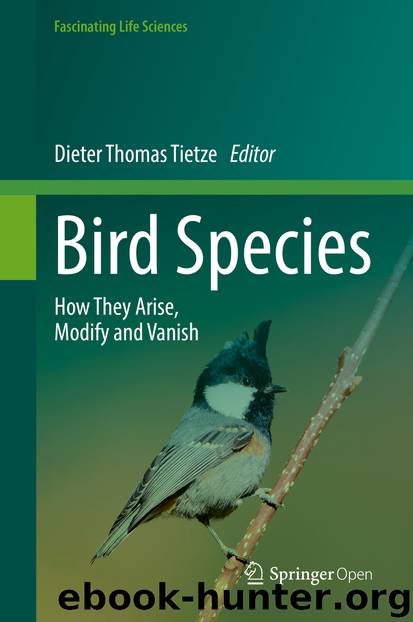Bird Species by Dieter Thomas Tietze

Author:Dieter Thomas Tietze
Language: eng
Format: epub
ISBN: 9783319916897
Publisher: Springer International Publishing
In the case of sympatric speciation, reproductive isolation is achieved without any geographic separation. This model of speciation has been debated for decades, but it can clearly happen under particular, albeit reasonable, biological conditions, as demonstrated by mathematical models (Gavrilets 2014) and empirical works (Savolainen et al. 2006; Sorenson et al. 2003). However, it seems to occur very rarely, and only a few such events in birds can probably be referred to as having happened in sympatry. Most importantly, it must be shown that the divergence of two contemporary and sympatric sister taxa has not involved an allopatric stage. In other words, the initial divergence must have occurred sympatrically, and the possibility of geographic isolation must be eliminated. One of the apparently most plausible sympatric speciation cases in bird concerns African indigobirds of the genus Vidua (Sorenson et al. 2003). This group of songbirds is found in Western and Southern Africa, and they are all host-specific brood parasites, with nestlings reared by waxbills, munias, and allies (Estrildidae) in particular. Male indigobirds learn their songs from their host species, i.e., their foster parents. Females preferentially mate with males that mimic the song of their foster parents (Balakrishnan and Sorenson 2006). Unlike in some parasitic cuckoo species where different “host-specific” females mate freely with males, the assortative mating mechanism in indigobirds clearly results in strong cohesion between hosts and parasites. The switch by a female to a new host can then drive simultaneous sympatric divergence as a consequence of learned behavior. Her offspring learn the song from their new host and are most likely to mate with siblings or the offspring from another female that switched to the same new host species (Lovette 2016).
Other proposed examples of speciation without geographic separation concern allochronic speciation, wherein two sister populations diverge due to temporal separation of their breeding periods, as has been suggested on several archipelagos in the Pacific and Atlantic Oceans inhabited by Band-rumped Storm Petrels Oceanodroma castro (Bolton et al. 2008; Monteiro and Furness 1998; Smith et al. 2007) (Chap. 6).
Download
This site does not store any files on its server. We only index and link to content provided by other sites. Please contact the content providers to delete copyright contents if any and email us, we'll remove relevant links or contents immediately.
| Anatomy | Animals |
| Bacteriology | Biochemistry |
| Bioelectricity | Bioinformatics |
| Biology | Biophysics |
| Biotechnology | Botany |
| Ecology | Genetics |
| Paleontology | Plants |
| Taxonomic Classification | Zoology |
Sapiens: A Brief History of Humankind by Yuval Noah Harari(14322)
The Tidewater Tales by John Barth(12627)
Mastermind: How to Think Like Sherlock Holmes by Maria Konnikova(7281)
Do No Harm Stories of Life, Death and Brain Surgery by Henry Marsh(6908)
The Thirst by Nesbo Jo(6882)
Why We Sleep: Unlocking the Power of Sleep and Dreams by Matthew Walker(6659)
Life 3.0: Being Human in the Age of Artificial Intelligence by Tegmark Max(5519)
Sapiens by Yuval Noah Harari(5325)
The Longevity Diet by Valter Longo(5044)
The Body: A Guide for Occupants by Bill Bryson(5033)
The Rules Do Not Apply by Ariel Levy(4912)
The Immortal Life of Henrietta Lacks by Rebecca Skloot(4552)
Animal Frequency by Melissa Alvarez(4430)
Why We Sleep by Matthew Walker(4395)
The Hacking of the American Mind by Robert H. Lustig(4342)
Yoga Anatomy by Kaminoff Leslie(4334)
All Creatures Great and Small by James Herriot(4277)
Double Down (Diary of a Wimpy Kid Book 11) by Jeff Kinney(4244)
Embedded Programming with Modern C++ Cookbook by Igor Viarheichyk(4144)
